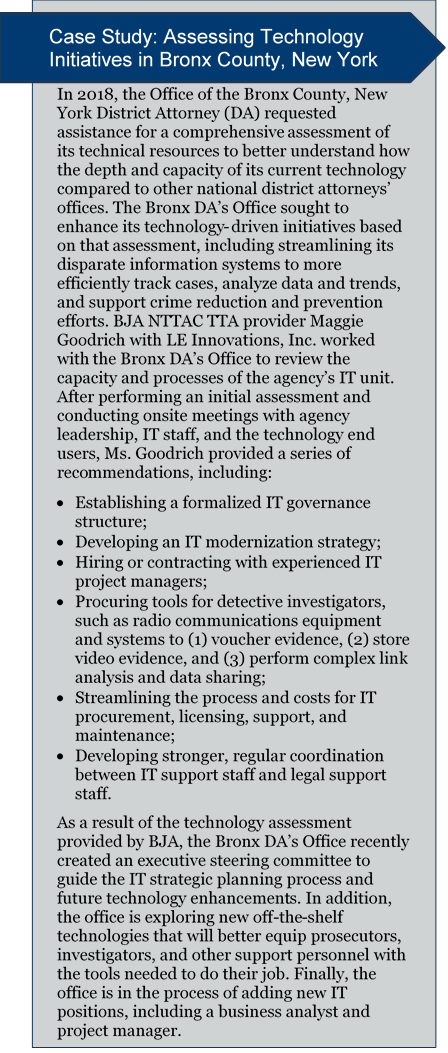Support for Criminal Justice Agencies through the Technology Initiatives Assessment Training and Technical Assistance Program
Background
Across the United States, criminal justice agencies have adopted various types of technology-based tools and processes to support crime prevention, law enforcement, and other aspects of the justice system. This technology adoption has included the use of hard technology, such as closed-circuit television cameras, computers in squad cars, and body-worn cameras, as well as soft technology, such as risk assessment instruments and crime mapping. However, a recent National Institute of Justice study revealed that the capacity for identifying, acquiring, and using technology tools varies both within and across justice agencies, and many jurisdictions still lack a guiding strategy for technology adoption.
support crime prevention, law enforcement, and other aspects of the justice system. This technology adoption has included the use of hard technology, such as closed-circuit television cameras, computers in squad cars, and body-worn cameras, as well as soft technology, such as risk assessment instruments and crime mapping. However, a recent National Institute of Justice study revealed that the capacity for identifying, acquiring, and using technology tools varies both within and across justice agencies, and many jurisdictions still lack a guiding strategy for technology adoption.
To support technology adoption and integration, the Bureau of Justice Assistance (BJA), through the BJA National Training and Technical Assistance Center (NTTAC), developed the Technology Initiatives Assessment Training and Technical Assistance (TTA) Program. Through this specialized TTA program, BJA NTTAC supports state, local, and tribal justice agencies with enhancing or expanding their capabilities to use technology for strategic decisionmaking, as well as for responding to and preventing crime.
Summary
Through the Technology Initiatives Assessment TTA Program, BJA NTTAC connects justice agencies to training opportunities and subject matter experts who provide actionable recommendations for strengthening the use of technology within the agency. Working with its partner TTA providers, BJA NTTAC supports a range of services related to the technology landscape, including:
- Cataloging current data resources, data sources, and technology, as well as quantifying their cost and value;
- Evaluating existing data collection and storage procedures;
- Recommending staff training or development opportunities to increase knowledge, capability, and capacity;
- Identifying gaps and needs in areas such as dispatch software, case management systems, mobile technologies, and information technology (IT) support; and
- Providing recommendations to enhance systems integration, software adoption, staffing needs and capabilities, and other technology-driven initiatives.
By requesting TTA through BJA NTTAC, justice agencies will receive tailored recommendations and evidence-based solutions to meet their communities’ unique needs. The recommendations for enhancing technology initiatives, from the basic procurement of tools to training staff to use technology for crime analysis and other functions, will differ agency-to-agency; the needs of a prosecutor’s office in a mid-sized city may not match those of a large county sheriff’s office. Regardless of the size or type of justice agency, BJA NTTAC will work with you to address the technology challenges facing your community.
Access the Technology Initiatives Assessment TTA Program flyer for a summary of this TTA support available to state, local, and tribal justice agencies.
To submit the work of your organization or jurisdiction for consideration to be featured in a future BJA NTTAC TTA Spotlight, please email BJANTTAC@ojp.usdoj.gov.
If your agency or community is interested in technology initiatives assessment or would like to apply for technical assistance, please contact BJA NTTAC at BJANTTAC@ojp.usdoj.gov to discuss your unique criminal justice needs.